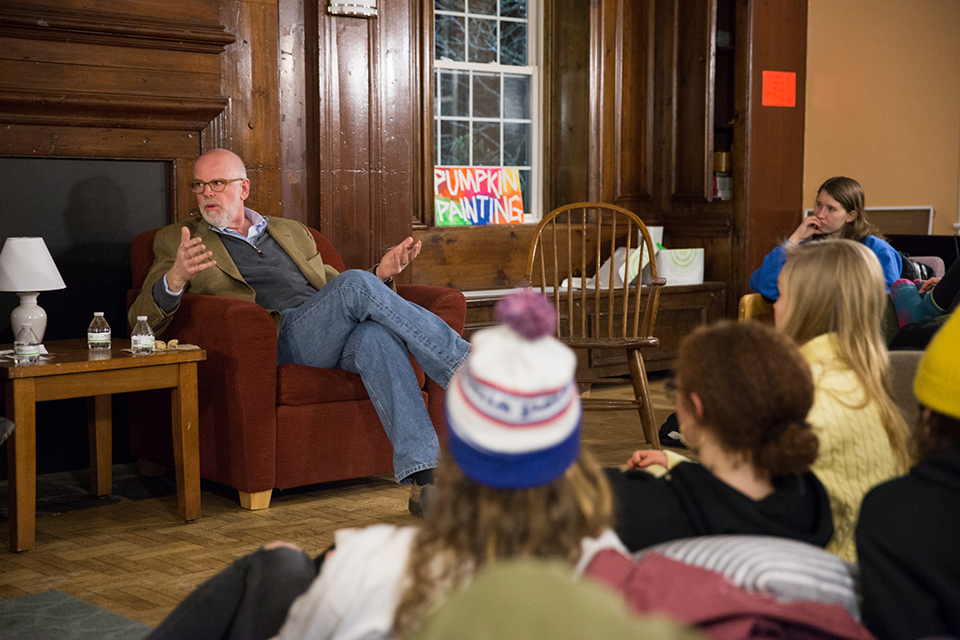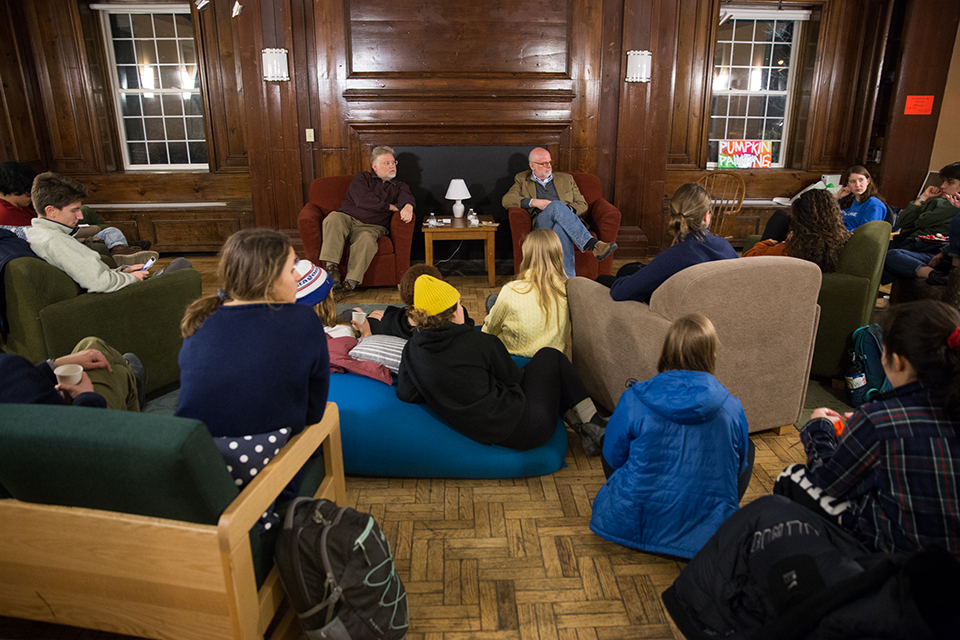The president in the living room: Rose answers student questions
February 21, 2020
 Ann Basu
Ann BasuPresident Clayton Rose joined a small group of students in the living room of Reed House for an intimate question-and-answer session on Thursday evening. During nearly two hours of discussion, students pressed Rose on an array of hot-button campus issues, ranging from James “Jes” Staley’s ’79 P’11 status on the Board of Trustees to campus mental health services and the fight for a living wage for Bowdoin’s housekeeping staff.
The event was organized by members of Reed House with the assistance of Associate Professor of Classics and Reed House faculty advisor Robert Sobak, who served as a moderator during the discussion. Organizers capped the event at 35 students and first allowed residents of Reed House to sign up before extending registration to Reed House affiliates and members of various campus affinity groups.
The discussion between Rose and attendees was animated at times, with students and Sobak taking turns pushing back on Rose’s answers or pressing him with multiple follow-up questions.
Early in the discussion, students questioned Rose about the content of his email to the campus in October announcing progressive increases to the minimum starting wages for the College’s hourly employees. In his email, Rose cited Maine’s tight labor market and a new round of hiring at nearby Bath Iron Works as the impetus for the wage hikes without mentioning recent campus organizing by the Bowdoin Labor Alliance (BLA) and other student groups.
Asked why he omitted mention of BLA organizing, Rose admitted to having reservations about his phrasing.
“I was honest about what drove [the wage hikes] at the time, and that’s why we said what we said. In retrospect, would I have written it differently to acknowledge some of that? Maybe,” said Rose. “I’ve learned a lot, I make mistakes; I’m going to always do that. My goal is to get better and not try to make the same one more than once.”
Rose reiterated his personal support for the housekeeping staff and the College’s commitment to ensuring safe and fair working conditions for campus employees while defending his decision not to respond directly to BLA organizing.
 Ann Basu
Ann Basu“When you’re dealing with specific issues—what needs to be addressed, what doesn’t need to be addressed, how we fix things—those are things that relate to the folks in housekeeping, and the way that I think is the best way to handle it is to work with our housekeepers and not put any of them on the spot,” said Rose. “There are a variety of different points of view within that group about all of these issues, and I don’t want to create issues within the group, and I don’t want to call people out, and I don’t want to put them at odds with each other.”
Rose also defended the Board of Trustees’ decision not to censure Staley, who is the CEO of Barclays as well as a member of the Board.
Last Thursday, Barclays announced that Staley is under investigation by the Financial Conduct Authority and Bank of England’s Prudential Regulation Authority for statements he made to the regulatory agencies about his professional relationship with disgraced financier and convicted sex offender Jeffrey Epstein.
On Thursday, Rose restated his support for the committee’s decision not to remove Staley from the Board following an investigation by the Board’s Governance Committee into Staley’s relationship with Epstein.
“I share the Board’s view that, based on what we know today and what we understand, there isn’t anything in Jes’ actions or behaviors that warrants him stepping down,” said Rose. “He remains a trustee in good standing.”
A number of female students at the event voiced their objections to having a known personal and professional associate of Epstein serve on the Board of Trustees.
“It’s just really sad. We had the MeToo movement, and we had this moment of reckoning, and we’re trying to hold people accountable and not let these people run our institutions anymore, and it feels like we’re doing that at Bowdoin,” said Livia Kunins-Berkowitz ’22. “[Being a trustee] is an honorary position—it’s supposed to represent the best among us, the best that Bowdoin has to offer, and if we have any doubt, any suspicion that this is true, then he cannot be on this Board.”
Rose demurred when asked to offer further specifics about the Board’s deliberations.
“In the deliberations that the Board had, those thoughts that you’ve expressed and those feelings that you’ve expressed are views that were considered and articulated and thought about deeply,” Rose said.
Rose also addressed student concerns about Bowdoin’s investment in the fossil fuel industry, defending the College’s investment strategy and emphasizing the College’s commitment to investing in sustainable technologies.
“We’ve done more than most schools who’ve said they’re divesting. We don’t own any fossil fuel stocks, and we haven’t in a really long time,” said Rose.
He explained that Bowdoin’s only investment in fossil fuel companies comes through Bowdoin’s investments in large and diversified mutual funds controlled by external fund managers.
“When you allocate your money to a fund manager, you do not get to tell them what to do,” said Rose. “The deal is, you give them the money, and then they go and invest in the strategy they’re going to invest in, and they’re going to buy and sell whatever they want to buy, and you’re either in or you’re not in, and that’s just the way that those things work.”
Rose said that Bowdoin does consider the investment strategies of the various mutual funds when choosing how to invest its endowment and said he expects the scope of the College’s investment to decrease as returns on fossil fuel investments continue to decline.
“In another couple of years, [investments in fossil fuel companies] will be almost de minimis amounts of anyone’s portfolio, including ours, just because people are going to get out of them, and they’re not going to make sense,” said Rose. “We could beat our breasts and say that we’re divesting, but it’s already happening, and it’s been happening for a while.”
Rose also addressed students’ concerns about strains on the College’s mental health resources, support programming for low-income and first-generation students, sexual and gender-based violence on campus and campus accessibility for community members with physical and mental disabilities. Rose noted that many of these programming areas, especially mental health resources and campus accessibility, will benefit from the College’s recently-announced $500 million capital campaign.
After the event, attendees expressed mixed reactions to Rose’s engagement.
“I definitely felt comfortable enough to be able to share something, and I think that that’s important to have in this space and it’s what we tried to offer in this opportunity,” said Zoe Stilphen ’22, a resident of Reed House and an organizer of the event. “He definitely seemed to really want to engage with the students, which I really did appreciate … I think he definitely could have gone a little further and a little deeper, but that gets into time [constraints] as well.”
“I don’t think I’ve ever heard him be more nuanced and unguarded,” said Kunins-Berkowitz.
Sobak, who interjected several times to correct Rose during conversation, thought the event set a precedent for the president and students.
“There were times where I felt that he was either incorrect in his answer or asserted something indefensible or that was fallacious, and that my role was to say, ‘no, no, no, that’s insufficient’ or ‘you have to do better than that,’” said Sobak. “I think that this is the first step in what will be a learning process for him and for everyone else in how to genuinely engage and let down his guard a little bit.”
Sobak said he remains hopeful that in future dialogues, Rose can let his guard down even more.
“In some ways it would be cool if he could take off his president’s hat for a night and be like, ‘alright, I’m going to be Clayton Rose, sociologist, member of this community.’”
Was tonight that night?
“No,” said Sobak.
Livia Kunins-Berkowitz ’22 is a columnist for the Orient.
Zoe Stilphen ’22 is a member of the Orient staff.

Comments
Before submitting a comment, please review our comment policy. Some key points from the policy: